Self-isolated Choratan is listening to poetry
I am sending a message to Ani on Facebook asking her when she is free to chat a little. She tells me to contact her later in the day, because right now she has to go pick some herbs. In the evening I ask her how her herb-picking went.
- I still don’t know the difference between the herbs. I guess I will have to ask my students again. They tried to explain it from the other side of the fence yesterday, but I didn’t understand from distance.
Social distancing is an important requirement these days while communicating, meeting people or studying. Although they joke that Choratan is the end of the world but people here are vigilant too.
Ani Khachatryan moved to the village of Choratan of Armenia’s Tavush province last September to teach English through Teach For Armenia program.
Անի Խաչատրյանը
Due to the state of emergency, classes will resume in several weeks only, however Ani decided to stay in the village.
“I want to be near my students. It’s more peaceful here, far from the reality and stressful situations. I thought doing some agricultural work would keep me away from the pandemic, I’ll be with the students and together we will overcome this situation.”
Agricultural works in Choratan are in full swing, but the students’ lives have changed. They had to give up a number of initiatives and activities and switch to online way of living.
“We have a literature group in the village where we gather to read, discuss and create. In order not to fall behind we decided to have an evening of poetry online. We all joined in a video call and started reading poetry. It was interesting that everyone's families, whether they wanted it or not, have joined in and were watching and listening. It was an evening of poetry for the whole village,” says Ani.
In her spare time Ani is studying foreign languages, photographing and working on a land near her house. The students have taught her how to properly grow and care for flowers, recognize the mallow, and offered her mallow recipes. Their help was especially important in the early days of moving to Choratan, when Ani was just getting acquainted with the village life.
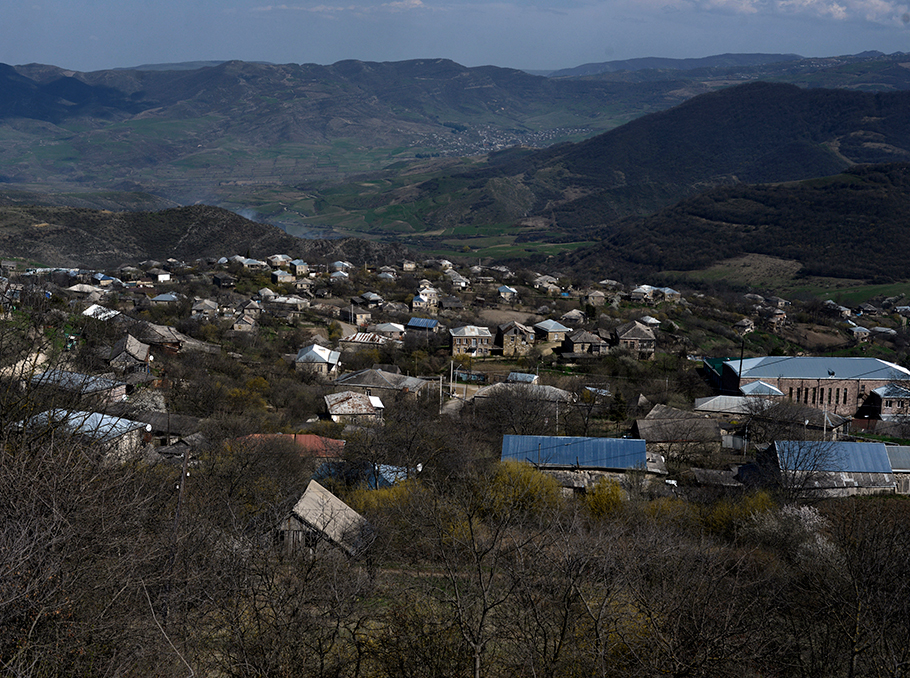
Photo: Mediamax
Now, everybody in the village knows Ani and she doesn’t feel like a stranger anymore. When everything goes back to normal she will visit with people and receive guests, and together with the students they will pick up where they left off.
“We look forward to the day when we can go to the pastures together again and no fences separate us anymore.”
Students and teachers in Stepanakert have switched to distance learning
Fortunately, no one in Artsakh has contracted the virus yet, but classes here have also been postponed till April14. Artavazd Boyajyan connects with his students from the Stepanakert Physics and Mathematics School every day via ZOOM.
“We are doing classes early in the morning, so that the students don’t oversleep and feel like they are on a vacation. Classes at school are 45 minutes long, but these days they may last over 2 hours, until the students get tired. Online lessons have one advantage though. We can record them, and those who were not to able join in the class or did not understand it well enough, can replay it later and catch up.”

Photo: Artavazd Boyajyan's personal archive
Artavazd is from Panik community of Gyumri. He applied to Teach For Armenia to teach math in a village. It was a surprise for him to learn he would be teaching in Stepanakert.
“In the course of time, I came to love Stepanakert. I have avoided city life since university, and can’t stay even in Yerevan for too long. There is this urge to go to my village or back to Stepanakert. Life is different here: there are no big events, crowds or work overload. It's quiet. "
The first months were hard. Artavazd was in a new environment, with a new job and a few acquaintances. Then he became friends with the dance teacher of “Tnjre” traditional song and dance ensemble and started dancing. They give concerts, perform in various communities of Artsakh and conduct open lessons.
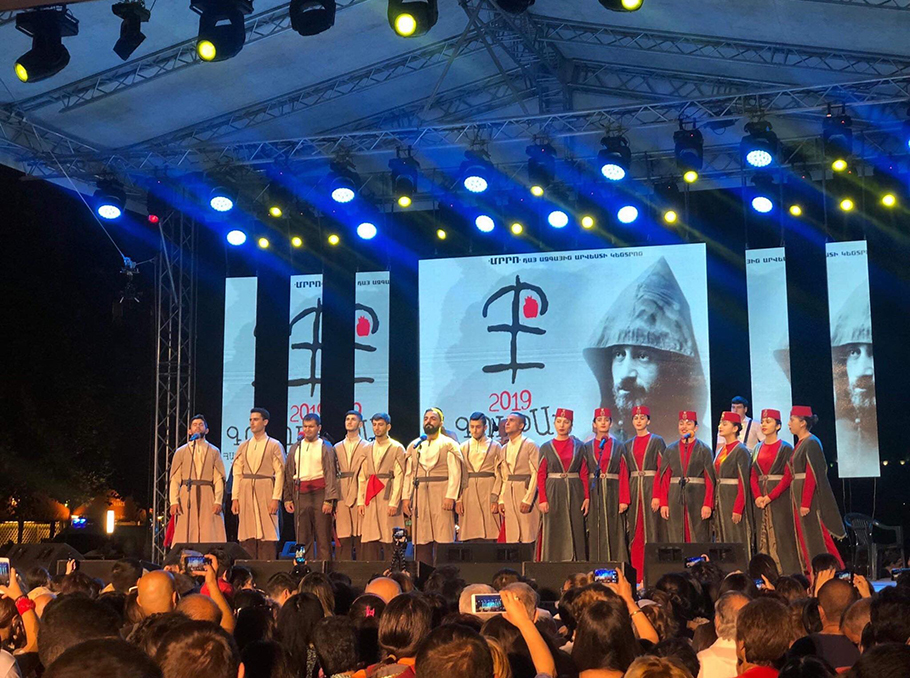
Photo: Artavazd Boyajyan's personal archive
Artavazd is very busy nowadays. He has individual meetings with his students when necessary. One of his students was the only winner of “Kangaroo” Math Contest in Artsakh last year.
They also implement community projects. Artavazd has organized book collection for Artsakh libraries and built two hiking trails in Karvachar last December with grant money. Next is the construction of a rock climbing wall in the gym. The program was drafted and sent to donors, and they are now waiting for a response.
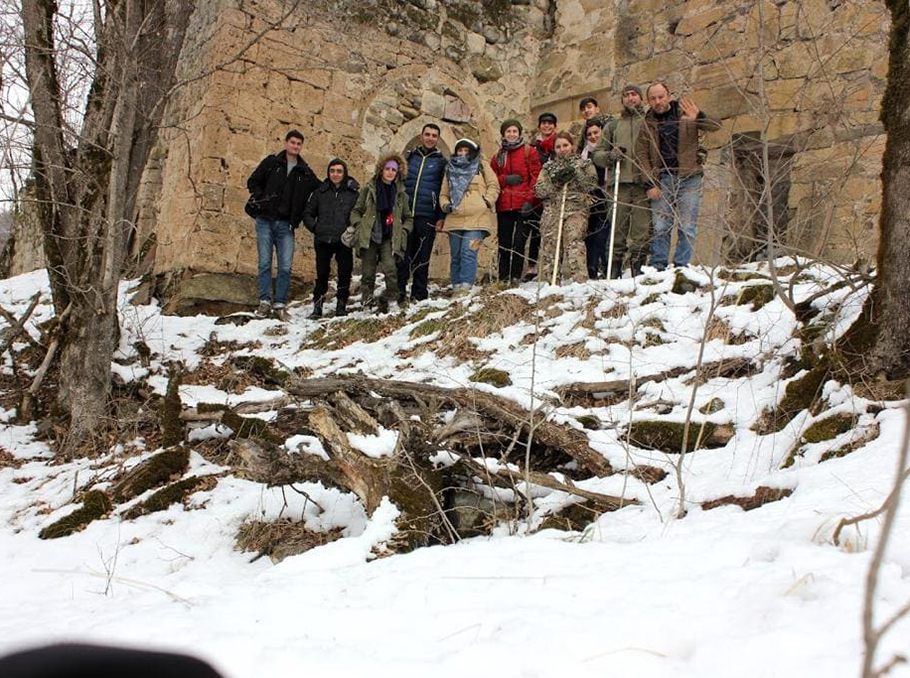
Photo: Artavazd Boyajyan's personal archive
Artavazd will teach at the school in Stepanakert till the end of the school year, but he already has plans as to how to keep in touch with Artsakh. He is taking evening classes on tourism after work. To promote mountain tourism Artavazd has set up “Trtu” hiking club and invites people to discover the hidden places of Artsakh.
Hin Shen is waiting for football club meetings
The rumors about coronavirus have reached Hin Shen community of Artsakh, but changed nothing in people’s lives. The village has been isolated even before the pandemic and people have lived without any contact with the outside world.
English teacher Sona Gevorgyan rarely leaves the village. Hin Shen has become her home for the next two years. Even today, she doesn’t think about going back to Yerevan, because the village might need her help with team engagement. Today, her main concern is to make sure that the students don’t fall behind with their schoolwork.
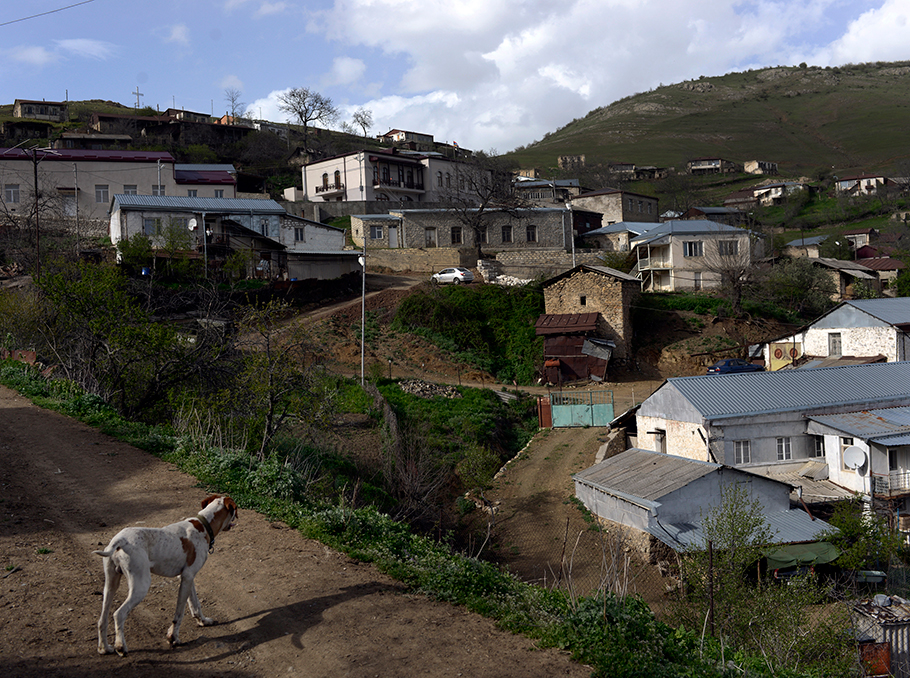
Photo: Mediamax
“It is very difficult to organize distance learning in the village. There are families who don’t even have a computer. We have a special needs student, so we have to figure out how to work with them. Teachers lack skills and don’t know computers. It’s impossible to keep in touch with parents, as many don’t even have phones. We are looking for individual approach and individual solutions for each student.”
As usual, children keep coming and asking Sona for a walk. She explains that they have to follow the rules and not gather in groups for some time. Entertaining children in these conditions is problematic.
When we visited Hin Shen in fall 2019, the children were ecstatic and told us they would have their own park in the village soon. The swing park opened on June 1. The establishment of “Armath” engineering laboratory was also an extremely important event in Hin Shen. Engineering education was a novelty in this remote village, cut off from the world.
The lab is intended for 4 villages, but due to the transportation problem only the students of Hin Shen and neighboring Yeghtsahogh can attend classes.
Sona decided to use football to ensure communication between isolated villages. She applied to the Huracan Foundation, (a UK registered charity with a global network that uses the power of football to inspire children and improve their educational opportunities). Many were skeptical though, because international programs usually bypass Artsakh.
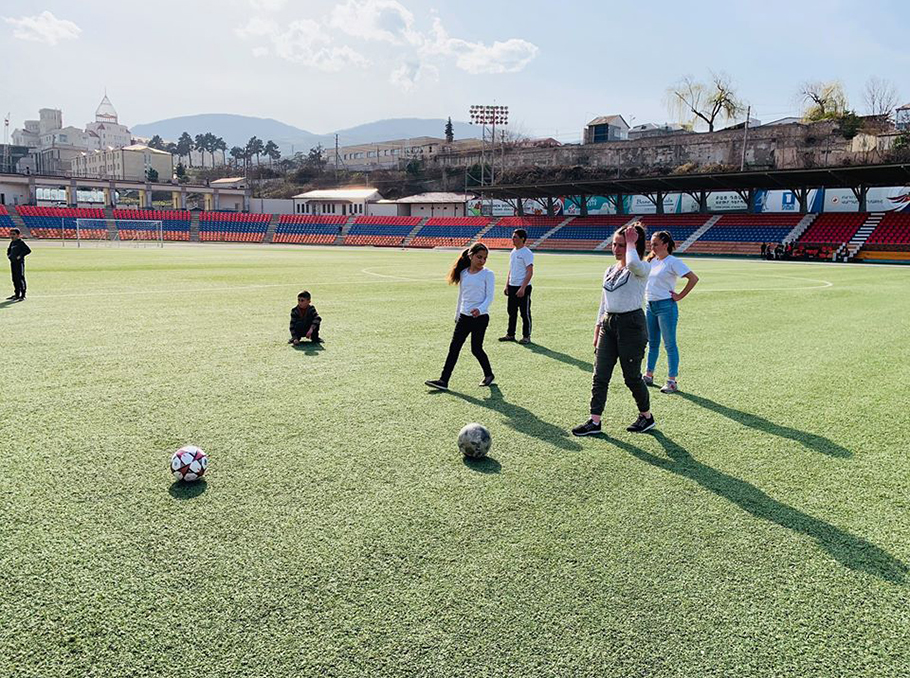
Photo: Sona Gevorgyan's personal archive
“In my application I wrote that I was applying to the Foundation with the hope that there wouldn’t be any discrimination. It doesn’t matter what status Artsakh has today. If children live here then they should have equal educational opportunities.”
Out of 33 applications from all over the world, only 5 were chosen, including the “FootbAll for All” initiative from Artsakh. With the Huracan Foundation’s funding, the purpose of football clubs of Hin Shen, Mets Shen and Yeghtsahogh communities has become to promote healthy lifestyle, make sports education available to everyone and provide humanitarian education. Volunteers from three communities conduct theoretical and practical training.
Due to the state of emergency the work of the club has also been suspended.
“Football becomes a platform for laying out the foundations of humanitarian education. When I tell the students we are going to play football with the children of the neighboring village, they immediately get excited to go and win. But it's not about winning. The game can be friendly, allow them to grow, develop, and most importantly communicate. They can develop critical thinking through the game and help each other. Children learn to work in a team and respect each other during the work process. They come up with initiatives and start to believe that they are important in the team, that they can create something in their community, achieve something.”
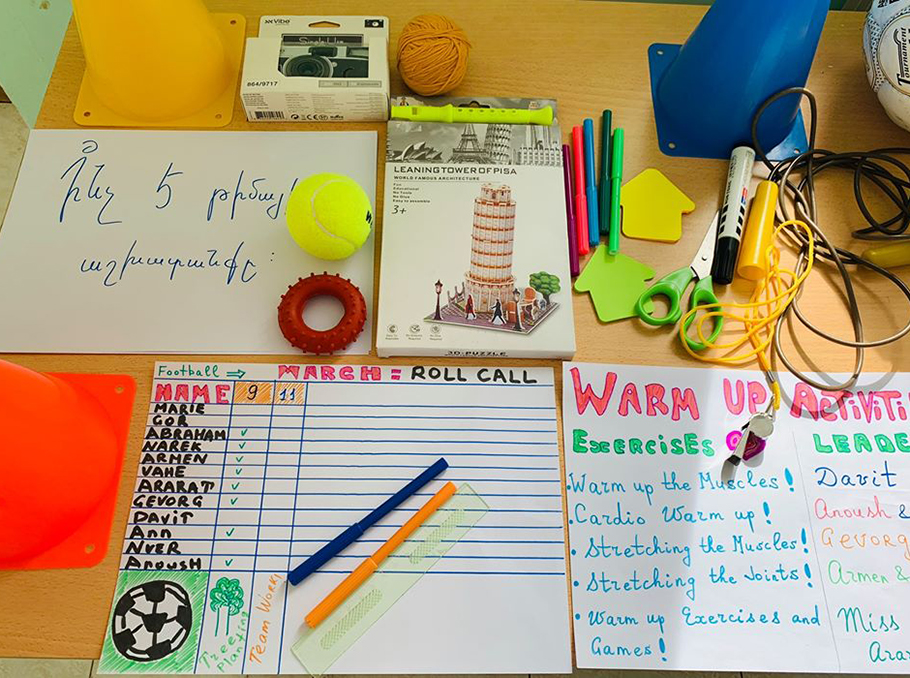
Photo: Sona Gevorgyan's personal archive
Today, the Argentinean “Huracan” team is in the center of attention of the children of Hin Shen village. When the player of the team of Armenian descent Briasco Balekian has recently scored a goal, they planted a tree in the school yard and named it after him, then took a picture and sent it to Briasco, promising to plant a tree after every goal scored by him and his team. Briasco responded immediately, promising to send them his jersey with an autograph and expressed a desire to meet the children of Hin Shen village.
Self-isolated in Chinari and back home to nature
Mariam was in Yerevan when she learned that classes would be postponed. Her students were constantly texting her, saying “Come back to the village, Ms. Grigoryan, it’s safer here.”
Mariam returned to Chinari even though communication was restricted. They were forced to leave some programs unfinished, like the “Free books” program at school and the one for obtaining garbage sorting bins. One of the students has built 5 bookshelves and hung them in different corners of the school for book exchange.
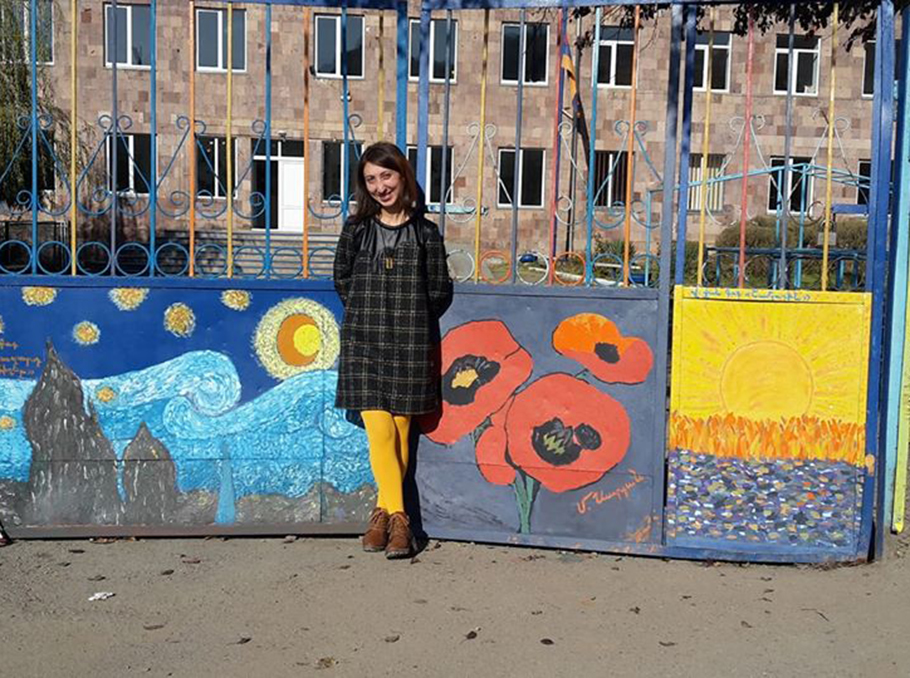
Photo: Mariam Grigoryan's personal archive
Now, they are doing their biology lesson online. Since the classes are small, up to 10 students in each, Mariam hoped they would be able to meet for practical work, however, due to restrictions they were unable to do so.
Before self-isolating, they have managed to finish painting the school gates. This was the first initiative of the teacher who came to Chinari through Teach For Armenia program. When she posted a fund-raising announcement on Facebook, the residents of Chinari living in Moscow were quick to respond. She came to Yerevan, bought paints with the raised money and went back. She briefly told only her 11-12th graders about the idea and was restless and doubted they would join in.
“I thought nobody would come. But the students proved me wrong. They met me on the way to school, helped me carry the paints and by the time we’d reached the school yard, there were already 20 students there. Words can't describe what I felt at that moment. It was beyond description.
We began painting Van Gogh’s “Starry night”, which is the biggest on the gates. It was not easy, but the students did it in a day. That day, at 8 o’clock in the evening, they went home happy and satisfied. That day I realized that I might not tell them much, but I had to do a lot, serve as an example.”
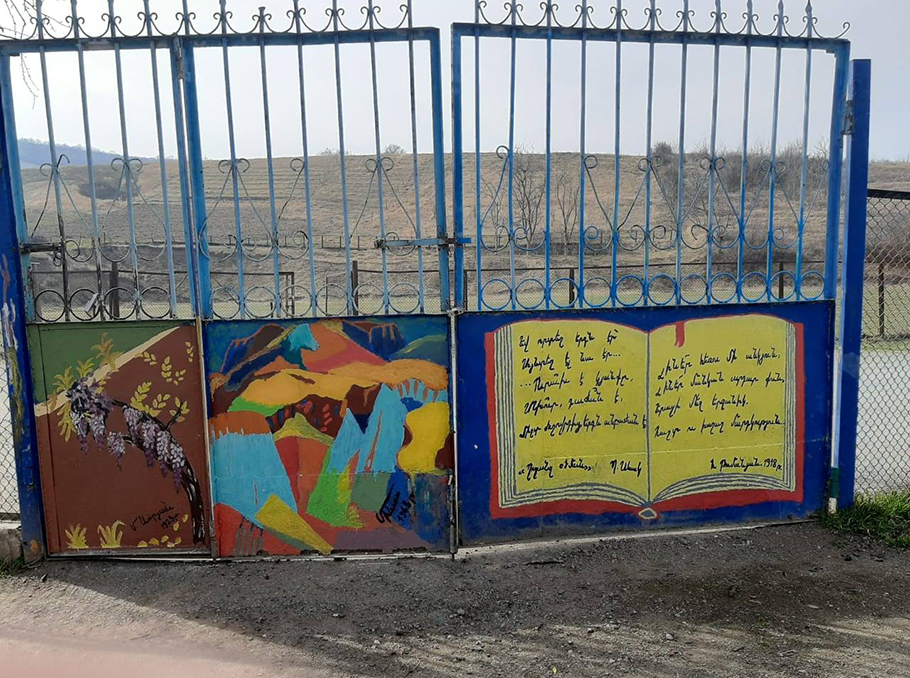
Photo: Mariam Grigoryan's personal archive
Later they painted Minas and Sarian on the gates, Hovhannes Tumanyan’s quatrains as well as lines dedicated to Komitas.
When we visited Mariam for the first time, she had just moved to Chinari and the classes hadn’t started yet. She was confused and anxious, afraid she wouldn’t be able to inspire the children.
“My life changed two months later. If you were to write another article about me now, that would be a story about another person, another world.”
These days Mariam has more spare time on her hands and is doing some agricultural works. She grows flowers near her house and prunes the grapes.
“My interpretation of social distancing and staying home is somewhat different. I perceive it as going back home and home is the nature: be in the nature, work with the land. In this period of time, it’s like nature is communicating with people, saying “you have forgotten me, come back, remember me”.”
Lusine Gharibyan
















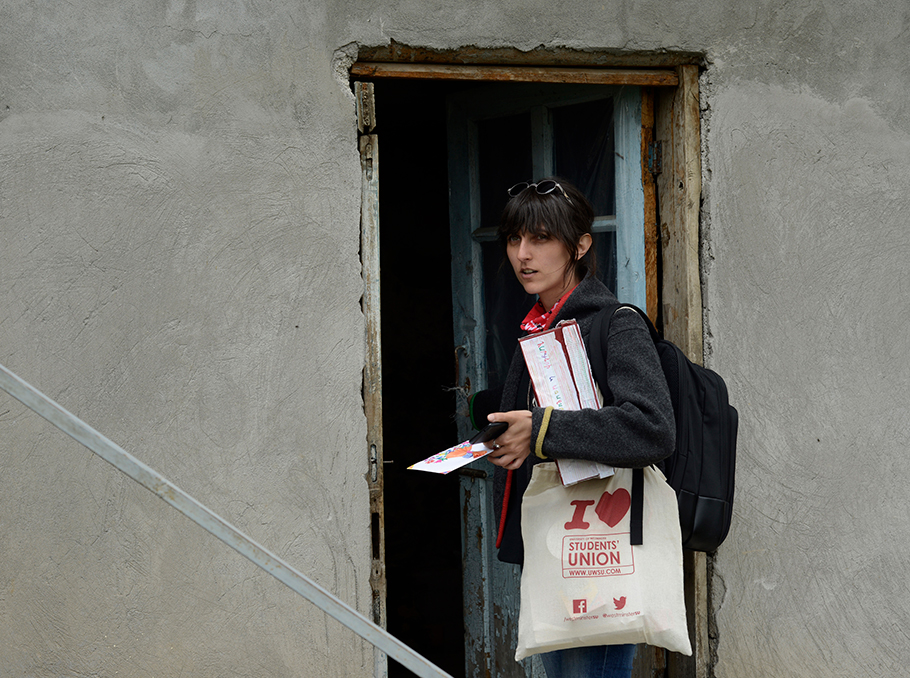
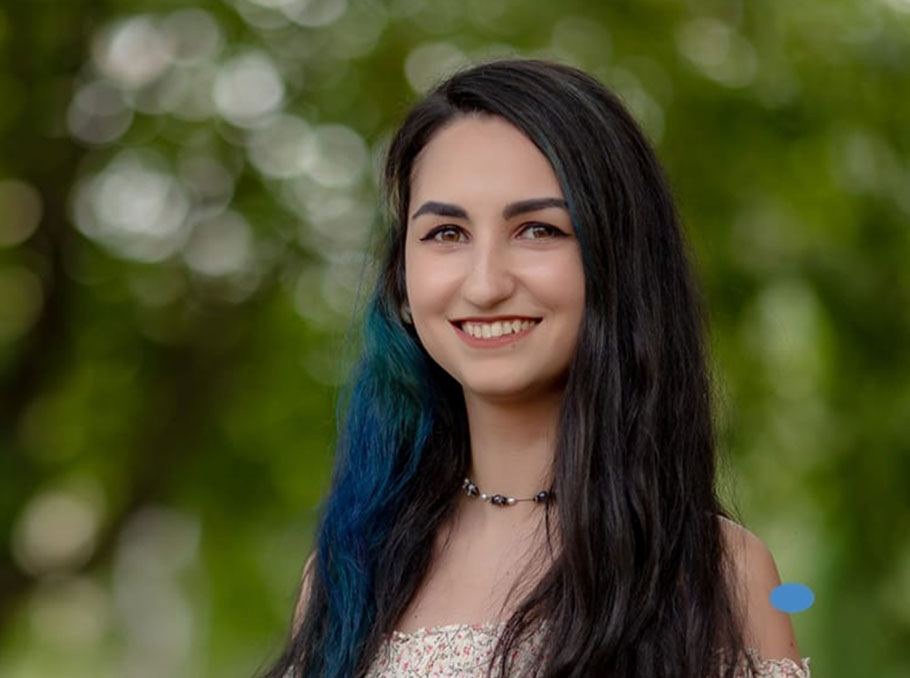
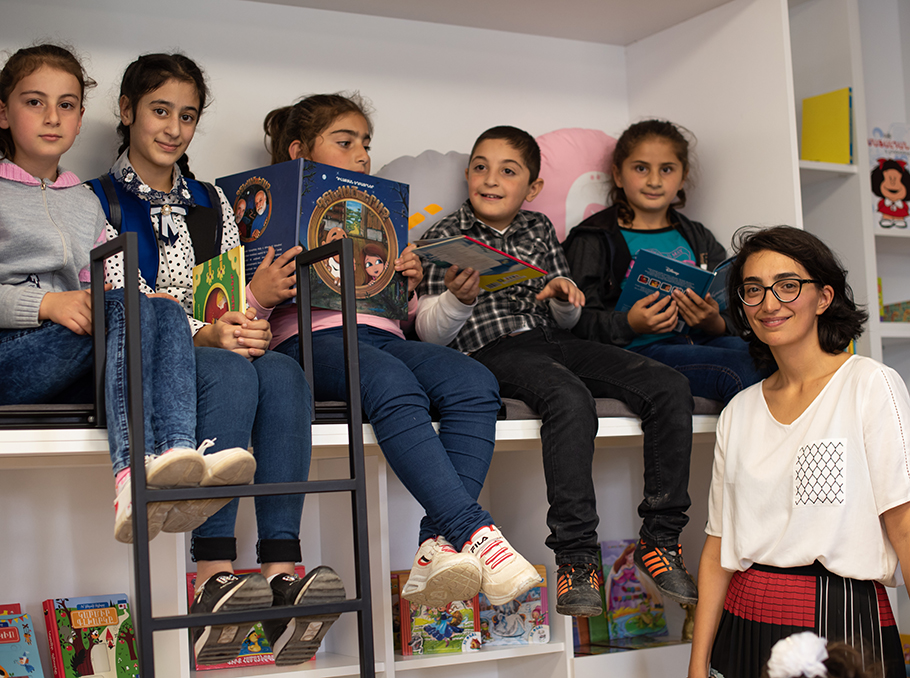
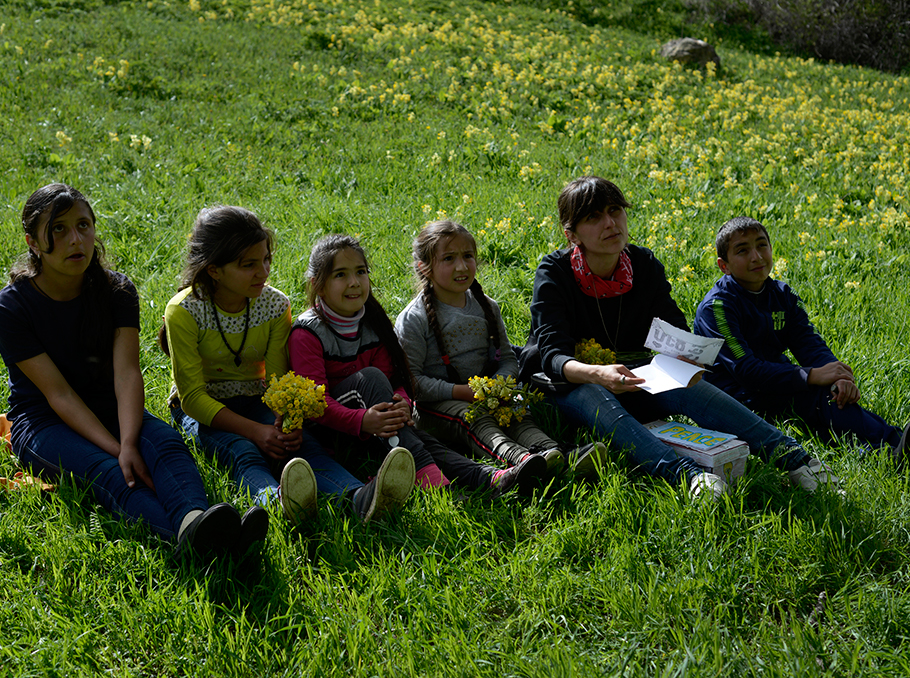
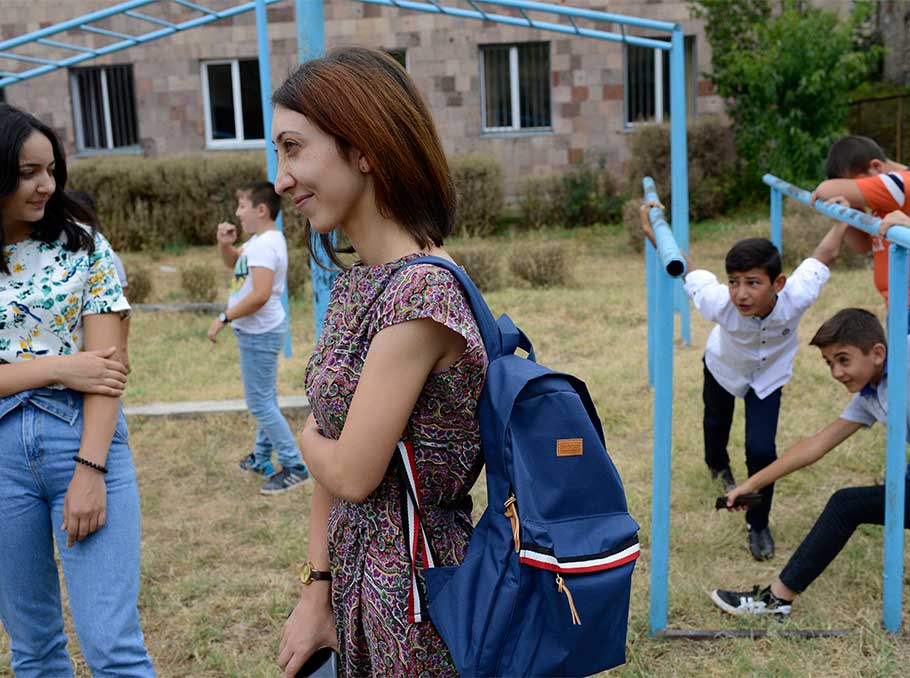

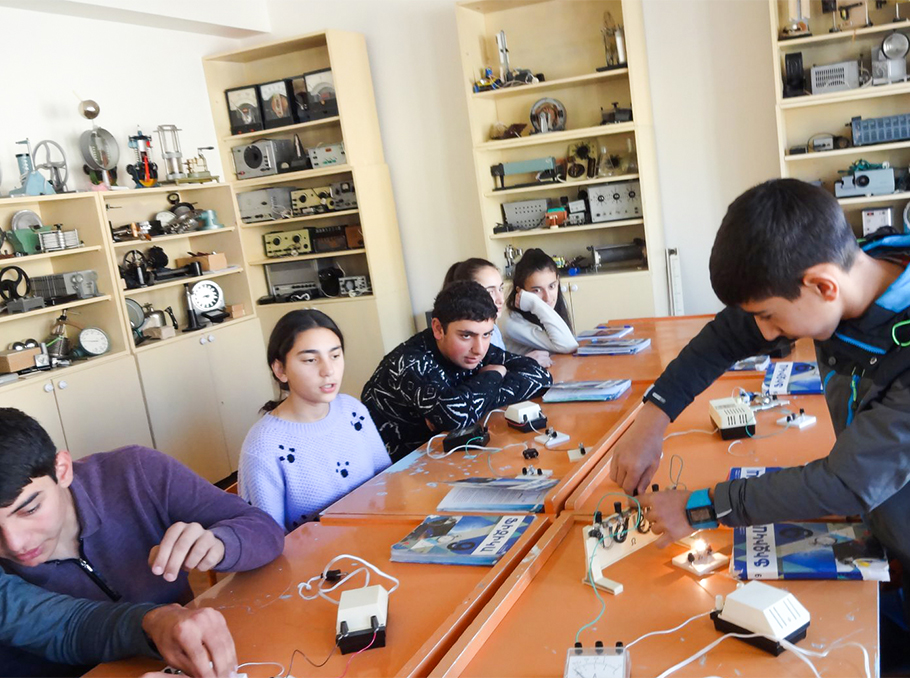
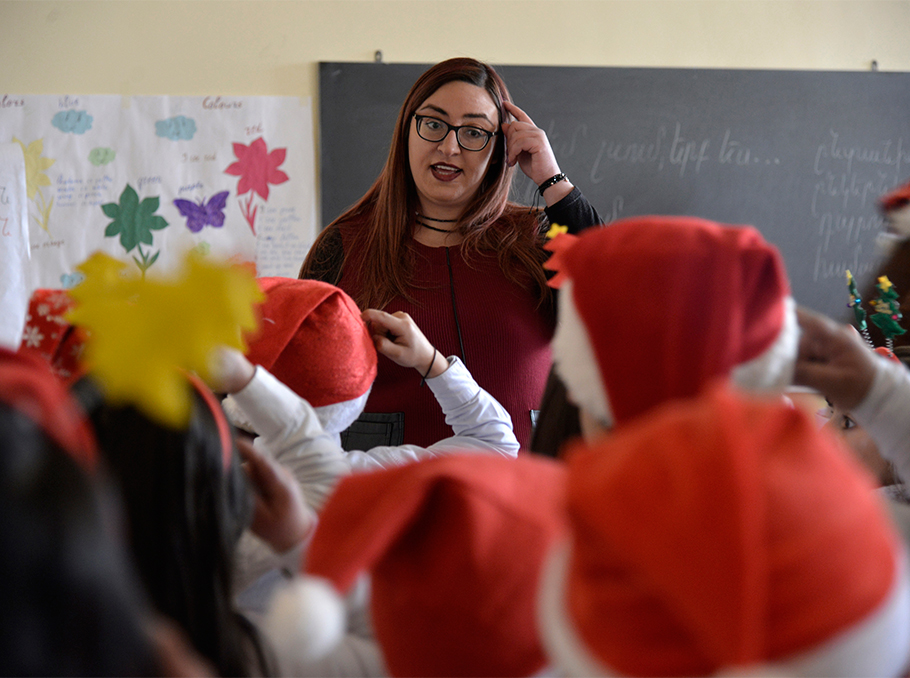
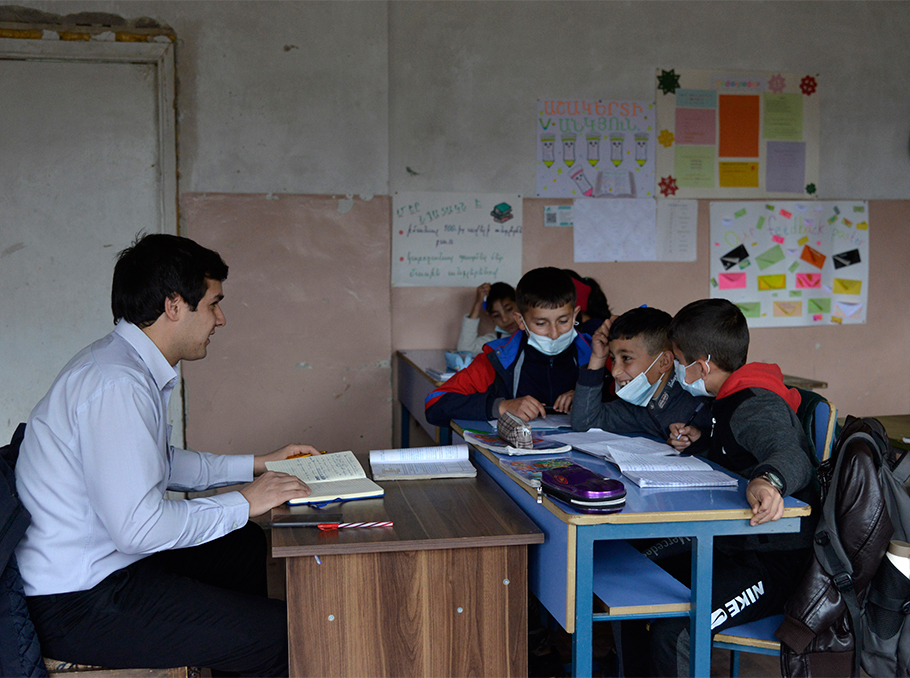
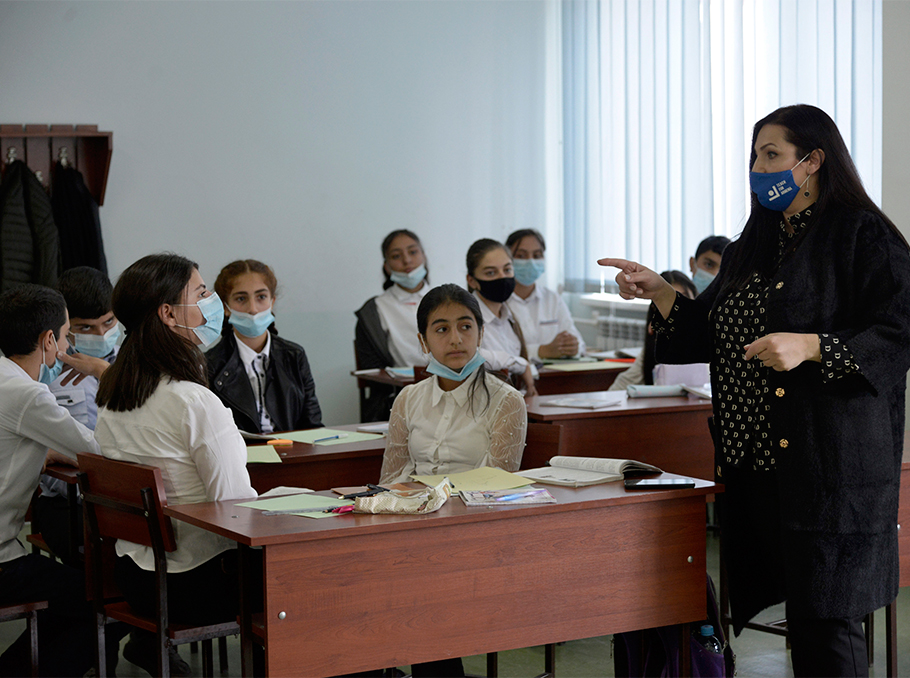
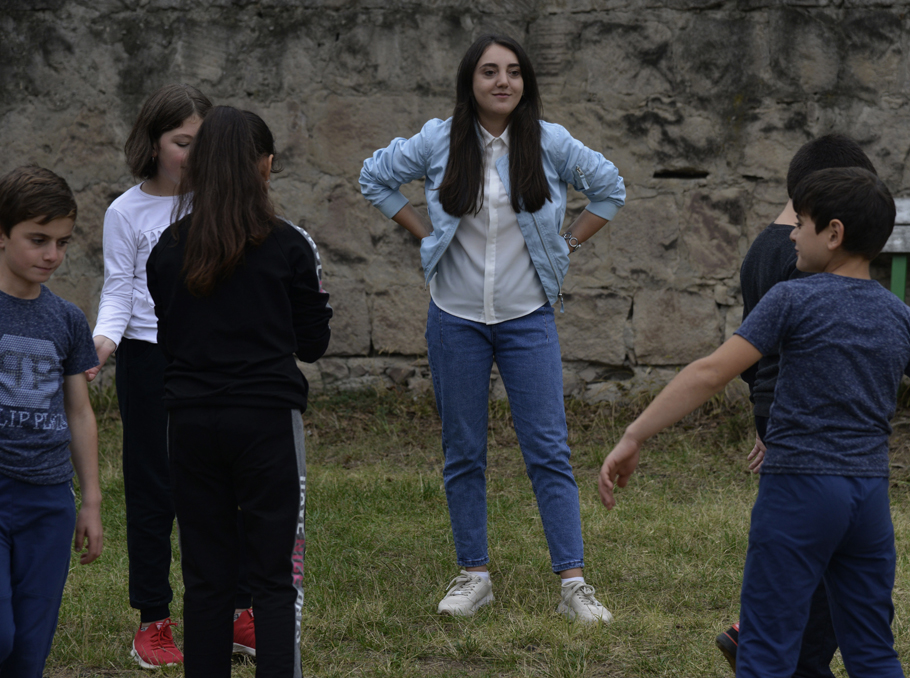





Comments
Dear visitors, You can place your opinion on the material using your Facebook account. Please, be polite and follow our simple rules: you are not allowed to make off - topic comments, place advertisements, use abusive and filthy language. The editorial staff reserves the right to moderate and delete comments in case of breach of the rules.